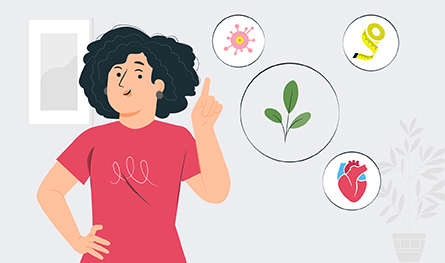Benefits of Tulsi Leaves – Nutritional Value, Health Benefits, and Side Effects of Tulsi Leaves

Tulsi leaves also called holy basil are aromatic shrubs that are known to have originated in the northern part of the central Indian province. The plant, however, now grows in most of the eastern world and is known as the queen of herbs. With many medicinal properties, the tulsi plant has found many uses in Ayurvedic, Unani, and Siddha medicines.

Nutritional Value of Tulsi Leaves
A look at the nutrients present in Tulsi leaves will make sure why these leaves are so precious and why they are regarded as a blessing for mankind. Here’s the nutritional value of Tulsi Leaves mentioned in the chart below:
| Nutrition’s in Tulsi Leaves | Nutrition Value |
| Sodium | 4 mg |
| Phosphorus | 56 mg |
| Protein | 3.15 g |
| Dietary Fibre | 1.6 g |
| Manganese | 1.148 mg |
| Calcium | 177 mg |
| Iron | 3.17 mg |
| Potassium | 295 mg |
| Carbohydrate | 2.65 g |
10 Benefits of Tulsi Leaves
Let us take a look at multiple Tulsi benefits in this post.
1. Tulsi leaves beat stress
Stress is the root cause of so many diseases. The modern lifestyle and the earnest efforts of people to maintain it adds to the stress levels. Tulsi is regarded as an herb of nature that has anti-stress properties as they contain Ocimumosides A and B compounds, which are effective in reducing stress. Thus, consuming a cup of tea made with Tulsi leaves is known to destress and rejuvenate people during stressful times.
2. Tulsi leaves protect against infection and wounds
The anti-inflammatory as well as anti-bacterial properties of these leaves serve as natural painkillers. Thus, these leaves protect against wounds and infections. Drinking juice of fresh Tulsi leaves mixed with black pepper powder can also cure fever.
3. Tulsi serves as an immunity booster
Complete with Vitamin C and zinc, Tulsi leaves act as a natural immunity booster to help strengthen the immune system of humans. This is another Tulsi plant benefit. When it comes to boosting immunity, Indians believe in consuming Tulsi as the best alternative.
4. Enhances Heart Health
The holy basil has the power to enhance heart health. These leaves can potentially reduce lipid content of blood and hence lower the chances of hypertension, stroke, ischemia, etc.
5. Tulsi leaves have anti-cancer properties
Tulsi leaves have phytochemicals, which prevent the risk of lung, oral, skin as well as liver cancer. The antioxidants present in these leaves help in cancer prevention.
6. Tulsi offer natural relief for cold and cough
This magical herb is known for its effective properties that aid in giving natural relief against cough and cold. Further, they also help in relieving bronchitis and asthma along with various other respiratory problems.
7. Preventing Kidney Stones
Kidney stones has become a very common problem these days. Tulsi leaves reduce the level of uric acid in the body and thus prevent the formation of kidney stones. Tulsi also benefits patients who have issues of gout and arthritis.
8. Act as natural blood purifier
Like other medicinal plants such as neem, holy basil also acts as a natural blood purifier. The plant aids in flushing out toxins from your digestive system. Hence, daily intake of Tulsi leaves is recommended to purify blood.
9. Regulates Blood Sugar Levels
Tulsi leaves are used to regulate the level of blood sugar as well. This magical herb increases your body’s metabolism to help regulate the blood sugar levels.
10. Tulsi aids in losing weight
If you want to lose weight, include Tulsi leaves in your diet. Tulsi leaves release toxins from the human body by improving the gut. This accelerates the body’s metabolism rate as well as fat burning process to aid in weight loss.
Side Effects of Tulsi Leaves
So, as you can see in the above list, there are some amazing benefits and uses of Tulsi leaves which makes it so revered by people in India. However, the plant has certain side effects for some people, which is important for you to know as well.
- In case of fertility, these leaves may affect male as well as female fertility and so if you are planning to conceive be careful about consuming these leaves
- People who are using blood thinning medicines should avoid using these leaves
- These leaves may also hamper your tooth enamel.
FAQs: Health Benefits of Tulsi Leaves
Yes, there are several Tulsi water benefits. Daily intake of Tulsi tea is said to have a relaxing effect and aids in lowering stress and also aids in many other health issues.
Tulsi plants including all varieties of the leaves allow far-reaching benefits to health. Kapoor and Krishna Tulsi are some prominent types of Tulsi to cure various diseases.
Tulsi health benefits are immense. Consuming 2-3 raw fresh Tulsi leaves every day is preferable, especially early in the morning.
Tulsi is beneficial for the treatment of cold and cough, fever, stress, asthma, heart disease, malaria, insomnia and so on. Further, there are many benefits of Tulsi for skin health as well.
Though there are several benefits of eating Tulsi leaves. But some people should avoid it or consult the doctor before consuming it. For instance, people on blood-thinning medications, pregnant women, people getting treatment for infertility etc. should avoid the intake of Tulsi.

Author Bio
Paybima Team
Paybima is an Indian insurance aggregator on a mission to make insurance simple for people. Paybima is the Digital arm of the already established and trusted Mahindra Insurance Brokers Ltd., a reputed name in the insurance broking industry with 17 years of experience. Paybima promises you the easy-to-access online platform to buy insurance policies, and also extend their unrelented assistance with all your policy related queries and services.
Other Health Insurance Products
Latest Post
So, you’ve crossed the fabulous 60 mark. Retirement may be on the cards, your kids might be off doing their own thing, and suddenly your knees are making more noise than your WhatsApp notifications. Welcome to the senior citizen club.
Now let’s talk about something most of us tend to postpone until a doctor gives us a reality check: health insurance. If you are wondering whether buying health insurance after 60 makes sense, the answer is a loud and clear yes. This article will cover everything you need to know about it, how it makes sense, how it differs from health insurance for young adults, and what you need to look out for when checking for medical insurance above the age of 60.

.png)
April 2 is observed as World Autism Awareness Day and there is no better way to observe the day than to raise awareness of this condition and to promote kindness towards autistic people. Read on to know more.


Car depreciation implies the difference between the cost of a car at the time of buying the car and when you sell it. A car insurance claim amount is determined by the car depreciation rate. The car depreciation rate is the reduction in the value of your car over its lifespan caused by wear and tear.


Fixed Deposits (FDs) are one of the safest ways to grow your savings. HDFC Bank offers attractive FD interest rates, allowing you to earn guaranteed returns on your investment. But before you invest, it's important to know how much interest you will earn and what your final maturity amount will be.


If you think of life insurance, chances are you are picturing something people buy in their 30s or 40s. But what if you are 65 or older and just getting started? The good news is that you are never too late. Whether you are thinking of easing the financial burden on your family, covering final expenses, or simply leaving behind a legacy, there are life insurance options tailored just for you.
This article will be a guide to life insurance for senior citizens above 65 years, explaining why it is important, the type of insurance options, and how to get the right policy for you.




